You Need to Choose Between Mental Health and Career. Says Who?

In this article
A career starts long before the first job. It’s a long story about the passions, education, skills, influences, experience, knowledge, aspirations, and efforts that shape a professional path. And that path, for sure, isn’t something we want to give up easily.
However, we’re often expected to sacrifice mental health for success. We have to choose between deadlines and healthy sleep, a promotion and quality time with loved ones, work tasks, and hobbies. Inspired by the LinkedIn “be a little extra” spirit, we make trade-offs every single day.
As a result, about 68% of Millennials and 81% of Gen Zers left jobs for mental health reasons from 2019 to 2021.
Let’s look at some other insights into the state of mental health at work. 👇🏽
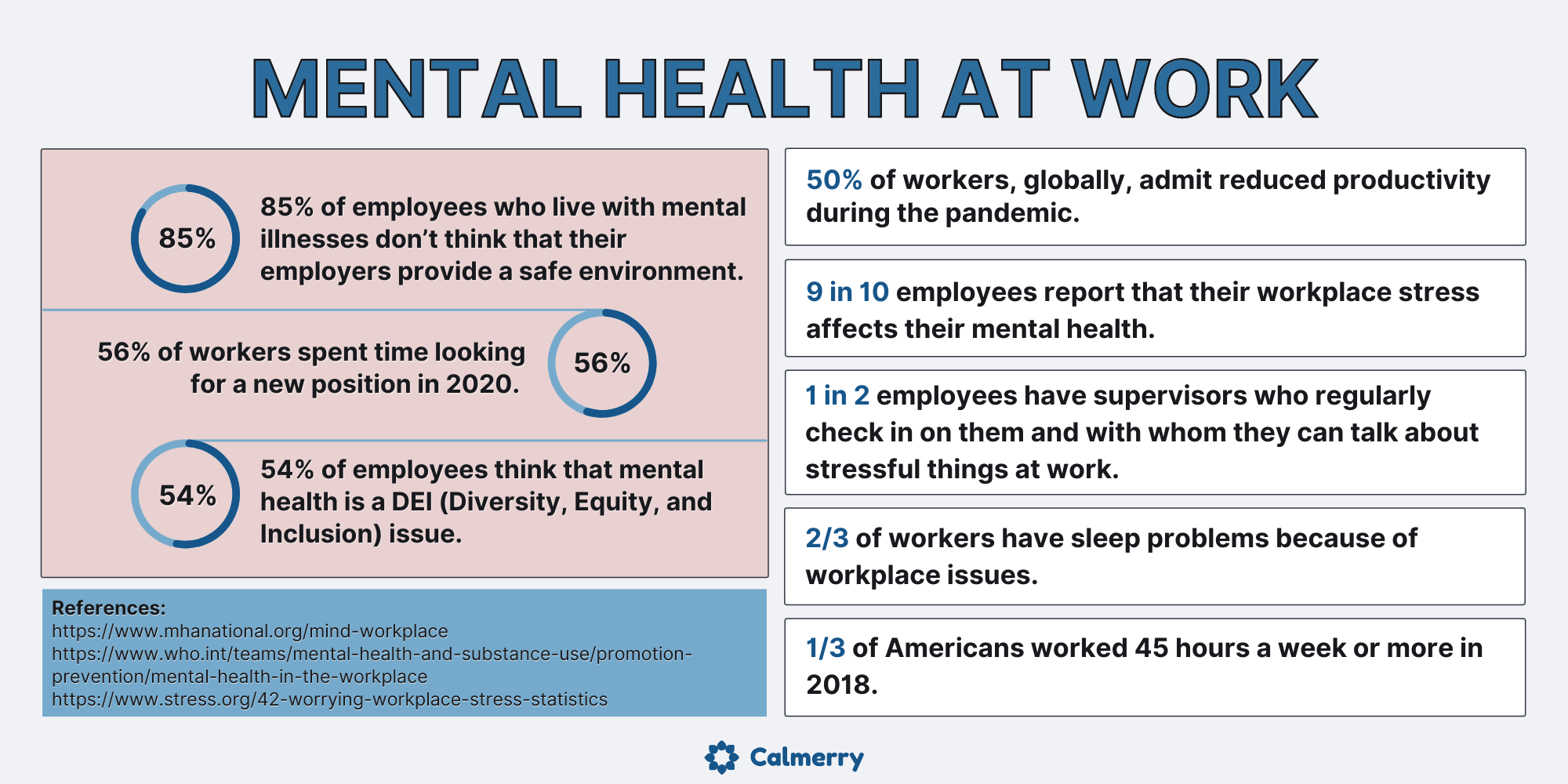
The reality is, mental health and career go hand in hand — mental health is an integral part of your professional success and happy life. You shouldn’t let your dream role be ruined by burnout or unhealthy company culture. Neither should your mental health suffer because of workplace issues that directly affect your well-being and ability to grow.
In this article, you’ll find out how to stay career-passionate while maintaining your mental health.
Workplace challenges that affect people’s mental health at work
Many people shoulder a disproportionate amount of distress in the workplace today. Here are some work challenges that can heavily affect employees’ well-being:
- Unclear tasks
- High or unreasonable expectations
- Lost motivation
- Unsuitable goals
- Physically and mentally demanding jobs
- Workaholic cultures
- Harassment, bullying, mobbing, discrimination, and abuse
- Inadequate health and safety policies
- Remote work fatigue
- Low levels of emotional support
- Unrelenting workloads
- Wage discrimination
- Poor work-life balance
- Low sense of connection
- Poor communication and management practices
- Inflexible working conditions
- Lack of recognition and appreciation
- Violation of personal boundaries
- Hostile or toxic work environments
- The “3B”: Burnout, boreout, and brownout
This list isn’t exhaustive.
We also know that mental health problems and disorders don’t discriminate when it comes to professions. They affect everyone, regardless of position and level of seniority. And many people live and deal with them both inside and outside the work setting.
People often feel afraid, embarrassed, guilty, and ashamed to share their experiences with employers or supervisors. For some, disclosing has even resulted in bullying and discrimination against them. Mental health stigma in the workplace may not allow people to cope healthily and thrive in their careers at the same time.
Thus, stigma prevents workers from getting the emotional support they need or finding ways to eliminate distress. Ultimately, many people leave their dream jobs for mental health reasons.
However, the common belief that you cannot have both a thriving career and thriving mental health is no longer sustainable.
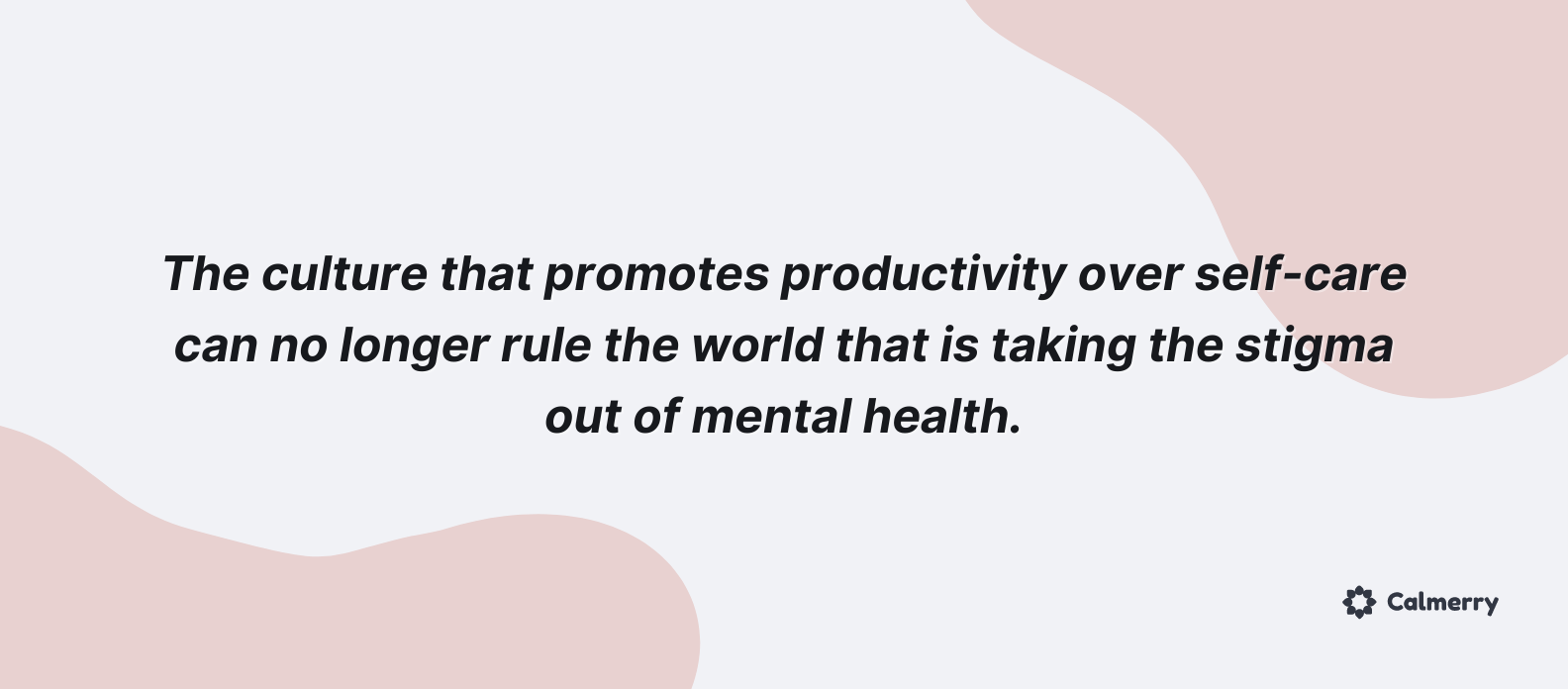
11 ways to balance mental health and work to benefit both and thrive in your career
So, pursuing a career doing what you love and taking care of your mental health are not mutually exclusive — they can and should be symbiotic.
Here are 11 ways to stop putting your mental health on the back burner and enjoy your career path.
1. Know the ways that work can impact your mental health
If you’re on your way to building your career, paying attention to the relationship between mental health and employment from the start can be beneficial.
First, finding a job that meets your emotional, mental, and physical needs can lead to positive well-being and prevent some mental health problems.
Second, there’s no job that will never impact your mental health. But there are high-pressure careers that are linked to higher rates of stress, exhaustion, emotional overwhelm, depression, PTSD, anxiety, burnout, and anger issues. It may be helpful to map these careers out ahead of time.
For example, mental health struggles tend to be more common for:
- Healthcare professionals
- Childcare workers
- Teachers and professors
- Military professionals
- Law enforcement officers
- Emergency responders
- Workers in the service industry
But don’t get discouraged about your choice if it’s in one of these fields — acknowledging what challenging situations you may face will keep them from catching you off guard. It can help you understand what resources will be demanded so that you can focus on them and minimize the negative effects.
If you work in an industry where mental health issues are common, kudos to you! Know that you’re not alone, and there are available resources to help: international associations, peer support groups, local organizations and charities, assistance programs, and corporate counseling services. You can also get emotional support by talking to a mental health professional on Calmerry.
If you’re in crisis, contact your healthcare provider, local mental health authority, or the National Suicide Prevention Lifeline at 1-800-273-TALK (8255) (En Español: 1-888-628-9454; Deaf and Hard of Hearing: 1-800-799-4889).
2. Spot and acknowledge the problems
It may be difficult to link specific problems at work with mental health issues. But it’s important to spot when work is encroaching on your life, what life facets it affects, and how underlying mental health problems might prevent you from achieving your full potential.
For example, you may find yourself stuck in spinning thoughts and engaging more in negative self-talk so that it’s hard to focus on something else. Do you feel anxious about piled-up tasks or dread an important meeting?
Or, you may notice yourself feeling more irritable, avoiding social activities, or snapping at others. Is it work that is affecting your personal relationships or vice versa?
To figure it out, ask yourself why your productivity is plummeting, and when you started losing interest in your career.
Think about what might be causing these issues. You can do this by practicing journaling and tracking your emotions and feelings. Our free self-reflection bot Coa can help you with both!
Besides, sometimes it’s not what you do at work that can make you stressed out, anxious, or depressed, but rather the way you go about doing it and managing daily life. There are some strong indicators that your work-life balance is unhealthy and possibly seriously affecting your well-being.
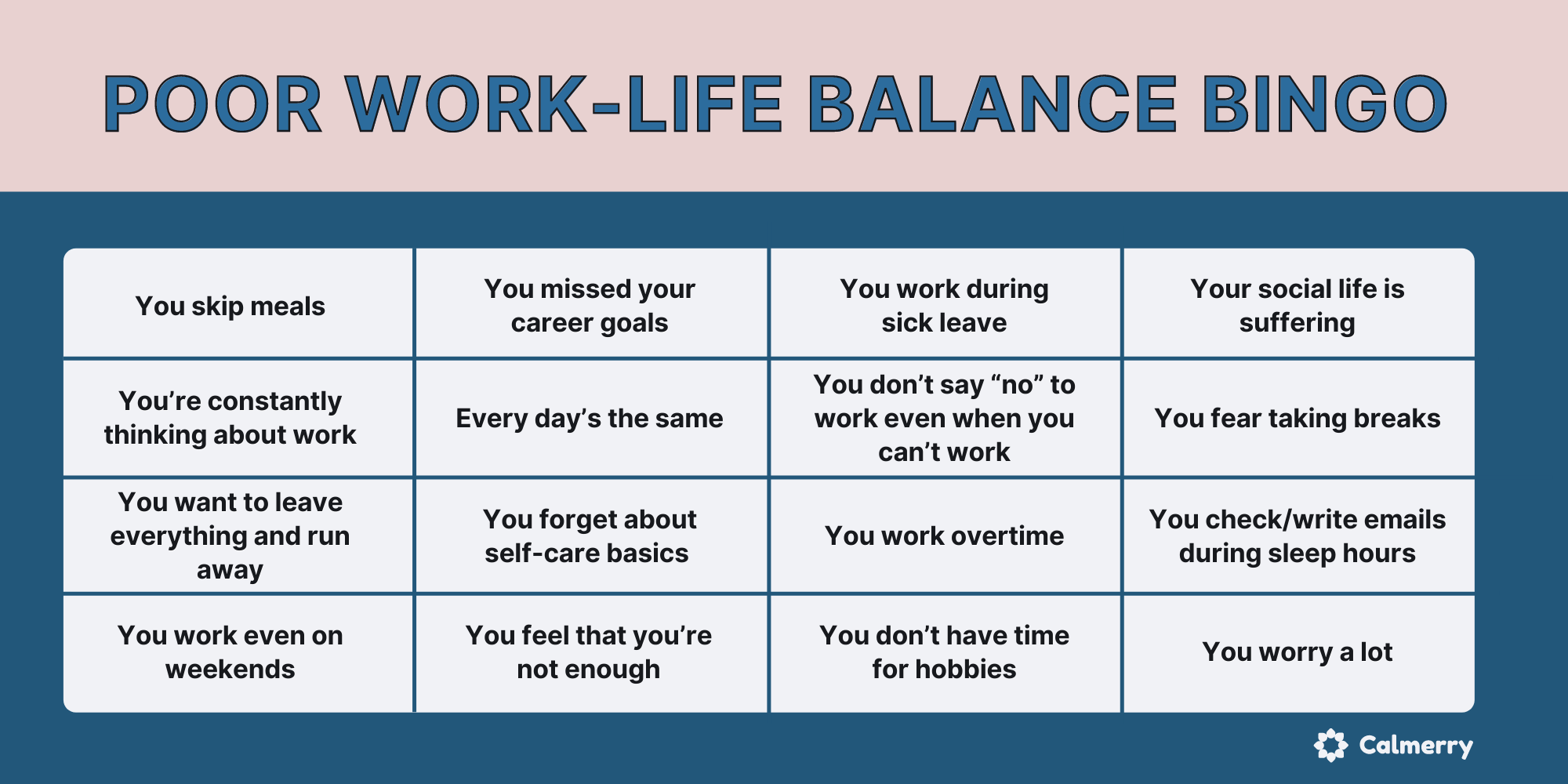
By the way, you can take a free burnout test on Calmerry to spot the symptoms and evaluate your mental health.
3. Ask for the flexibility and work conditions you need to do your best
Many companies worldwide have established telework and work-life policies to help employees find the right balance. And it goes without saying that during the COVID-19 pandemic, flexibility became a must.
Flexibility promotes better work-life balance and productivity. If you need more time for yourself and your loved ones, or the work pace is overwhelming for you, or you need more space to cope with mental illness, or you just need to take a break — talk with your employer, supervisor, or HR.
Discuss the working conditions that will suit you most: telecommuting options, changes in work shifts and start/finish hours, taking disability leave, adding more days off, sharing responsibilities with a colleague, etc.
Yes, talking about your mental health with an employer is hard. You may worry that you will be treated differently if you disclose the state of your mental health at work. But it’s your employer’s duty to ensure the conditions you need and take of the workforce’s mental health. And that doesn’t mean that you’re “needy” or “weak.”
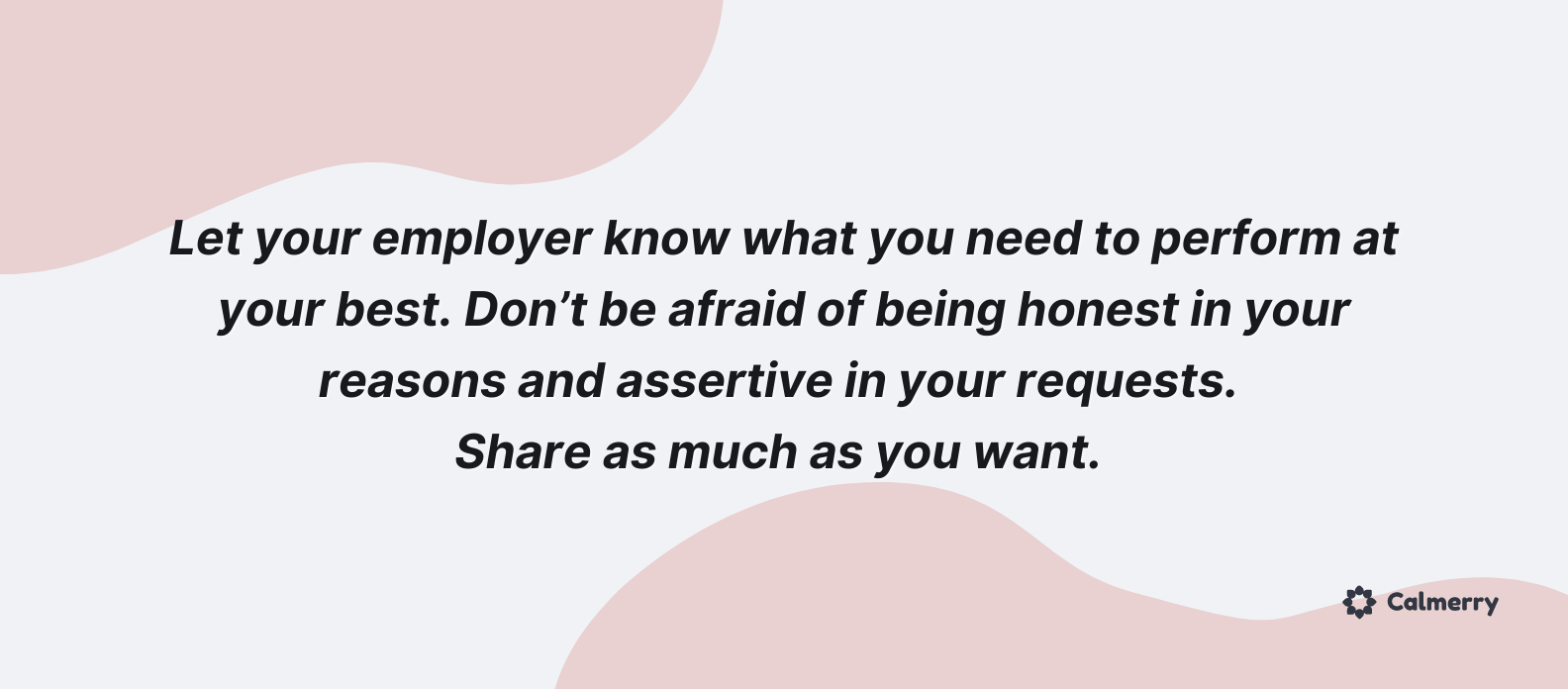
It’s okay to say:
“I feel I need to spend more personal resources on work than I have. I need to recharge.”
“I’m overwhelmed with tasks. It’d be better for me if we revised my areas of responsibilities.”
“I’m more productive after 4 p.m. Can we rearrange my schedule?”
“My family member needs attention. I want to work from home and take care of them.”
“I have some personal matters this Wednesday, so I’ll finish my tasks on Saturday.”
“I’m more productive working only 2 days at the office.”
“I should take better care of my mental health while maintaining my job goals. Please let’s discuss ways I could do that.”
Know your rights: No one can discriminate against you because you have a mental illness, including depression and anxiety. ADA and FMLA protect you.
4. Always make time to take care of yourself
We spend about 8 hours per day working — and many of us spend even more. Taking care of ourselves is seen as something secondary, something that we hardly do after getting home from work. But let’s reframe this habit — your mental well-being needs your attention before, during, and after work.
All the time is the right time to take care of yourself:
- Take regular breaks.
- Prioritize good nutrition and quality sleep.
- Set manageable goals each day and prioritize your tasks.
- Give yourself small rewards.
- Don’t rely on substances to cope with stress.
- Make time to stay physically active.
- Meditate, practice yoga, or take a moment to breathe deeply. These small acts allow the body and mind to relax and relieve stress.
- Do something you enjoy and try to combine it with your work process.
- Spend time with your loved ones and people from your support system.
5. Set boundaries
The hustle and bustle of nonstop tasks, emails, meetings, and deadlines can be overwhelming. But it is important to take time out of the daily grind to center yourself. If you’re exhausted, overscheduled, and overwhelmed, learn to say “NO” to:
- Replying to emails at night
- Working overtime or on weekends
- Meetings/calls after your work hours
- Feeling guilty for not managing to be effective or perform well
- Overcommitting
- Responding to work messages when you’re busy/need a break/don’t feel well
- Intruding into your private life and personal matters you don’t want to share
- Answering your boss’ calls or messages during your off-hours
- Making yourself available for everyone at any time.
Even if your job is literally your love, try to keep your work and personal lives separate.
6. Challenge your negative thinking
Quite often, some unhelpful beliefs lead us to emotional overwhelm and pressure. For example, you might think:
“If I refuse to work overtime, I’ll be fired.”
“I’ll never find such a suitable job.”
“I have to do more than they expect from me to prove my dedication.”
“I’m going to screw this up, for sure.”
“I’m not enough!”
Sometimes these unhelpful beliefs can be so overwhelming that you think either escaping or sticking with an unfavorable job is the only way to feel better.
Therapy can help find the root causes of negative thinking patterns and challenge them. Furthermore, therapy is a powerful tool to fight imposter syndrome, reevaluate your accomplishments, and get ready to face and healthily deal with new challenges.
7. Stay connected
According to MHA, positive relationships with coworkers are one of the top reasons employees feel satisfied at work. Connection is crucial, and it strongly impacts your well-being and performance.
The challenge is that people are often reluctant to talk about their feelings at work. They feel like they’re the only ones going through something difficult or that it would be inappropriate to ask for help or advice from a coworker. Opening up isn’t easy.
It might be a good idea to create a supportive network of colleagues with whom you can discuss job problems, exchange news, and talk about mental health. If you’re struggling to find someone you can talk to, your first resource may be your manager.
Although it’s difficult for employees to feel connected without sharing a common physical workspace during the pandemic, the web provides many ways to stay in touch. For example, you can chat over short video calls, set up a weekly newsletter, or create a text chat to LOL at memes and show your pets to each other.
8. Detect a toxic work environment
The work environment has a tremendous impact on our productivity, motivation, and well-being. Unfortunately, hostile work environments are common — about 1 in 2 workers face “unpleasant working conditions.” Also, harassment and bullying at work are commonly reported workplace problems.
A toxic work environment can seriously hurt your mental health, causing self-esteem issues, stress, anxiety, depression, panic attacks, or PTSD. It can also ruin your desire to develop and your plans to go on with your career.
Here are 19 signs of a toxic environment to watch out for in your workplace:
- Power and control as the basis of your work culture
- High levels of secrecy, gossipy behavior, and jealousy
- Narcissistic leadership
- The boss, managers, or colleagues exhibiting signs of bullying or encouraging it
- Signs of discrimination, injustice, inequality, and stigmatization
- Any form of abuse
- Microaggression
- Manipulation or gaslighting
- Unrealistic expectations/demands set by a supervisor regardless of your limits
- Common conflicts that are not processed healthily
- Unrecognized, unappreciated, or not fairly rewarded contributions
- Humiliation, shaming, judging, or offending you or your colleagues
- Violation of personal boundaries
- Lack of emotional support leading to feelings of isolation
- Your opinion or needs are ignored
- No clear feedback on your performance
- No room for positive and sincere relationships among employees
- High staff turnover
- Feeling unsafe
9. Know how to deal with workplace toxicity
An unhealthy work environment in a company can’t have the final say on your career. You deserve to grow your career in a healthy, comfortable, safe, and stress-free space. And you are worthy of living the healthy life of your dreams and enjoying the path you’ve chosen.
Here are a few quick tips on what you can do about workplace toxicity:
- Be able to separate yourself from toxic dynamics — don’t take things personally; build an emotional cocoon around yourself, so you’re not absorbing all of the toxicity.
- Set healthy boundaries — for example, you can make it clear how you don’t want to be treated or what behavior must be stopped. You can also think about how you want to interact with a person: choosing text conversations over verbal or cutting off interactions altogether, if possible. It’s fine to say, “Sorry, our conversations are over. I don’t want to talk with you anymore.”
- Reclaim your accomplishments — if you feel underappreciated, and if your supervisor often ignores your contributions and features others’, it can seriously affect your motivation and sense of self-worth. You can state why this is unfair and describe the contribution you’ve made and the efforts you’ve spent on this. You deserve to be equally recognized and get a good pat on the back.
- Don’t get overburdened — it’s not your fault, and it’s not your responsibility to change the culture of your workplace.
- Document all instances of bullying, abuse, and harassment — first, you’ll be in control of the situation with all the details. Second, you could report incidents of unacceptable behavior. Many victims are afraid to speak out against their offenders because they fear being judged or losing their jobs. Indeed, bringing abuse to light is an act of courage and a sign of great inner strength! You can talk to your HR or employer directly. Additionally, the EEOC and Project WHEN can help you take further steps.
- If workplace toxicity affects your mental health, it may be time to look for other opportunities — your well-being is a priority. If your company doesn’t want to acknowledge a toxic workplace environment and process the signs/incidents, it may be time to put yourself first and move on. Staying in a toxic work environment is never worth it.
10. Consider changing companies or your position
If the dissatisfaction you feel in your current job makes you underperform and unhappy, it’s probably time to move on and look for a different workplace. It’s important to make decisions that promote your career growth and are best for your well-being.
We know different “what ifs” can stop you from a shift. When you’re moving into uncharted waters, it’s hard not to feel uncertain about what to expect on the other side. So following your career but changing jobs or companies may be frightening, and you may even feel grief. That’s okay.
Be kind to yourself as you go through these experiences. Refocus from the “What if my future job/company is worse?” to “What if changes open up better opportunities and a happier me?” This job isn’t a once-in-a-lifetime opportunity.
Meanwhile, you can work on your resume and develop new skills to help you feel more confident.
11. Get professional help
Neither your career nor your mental health should feel like a constant sacrifice. And talking to a mental health professional can help you learn to lead a life full of joy and satisfaction without detriment to any aspect of it.
You can benefit from therapy if you:
- Want to rediscover your career passions
- Have no time for self-care
- Feel unfulfilled
- Lack emotional support to deal with a toxic environment
- Want to check whether you’re on the right path
- Are going through changes and life transitions
- Want to reclaim your self-worth and fight imposter syndrome
- Struggle with anxiety, stress, depression, or any other mental health issue
- Want to have more energy and motivation
- Need to reflect on your achievements and how satisfying your work has been to you
- Need help recovering after abuse, bullying, or harassment
- Want to find out who you are, what’s important to you, and what you want in life
On Calmerry, you can schedule a video session online with a licensed therapist at a time that’s convenient for you. Let them help you navigate through whatever emotional challenge you’re going through.
Positive shifts in the state of mental health at work
There’s no health without mental health. Fortunately, massive societal shifts are changing how we think about mental health at work and beyond.
For example, talking about issues of well-being brings awareness that they’re not just personal matters but a priority for society to focus on. Also, these shifts fight the bias that seeking mental health support is a sign of weakness or a luxury. Actually, it’s a necessity and an indispensable part of living a fulfilling life.
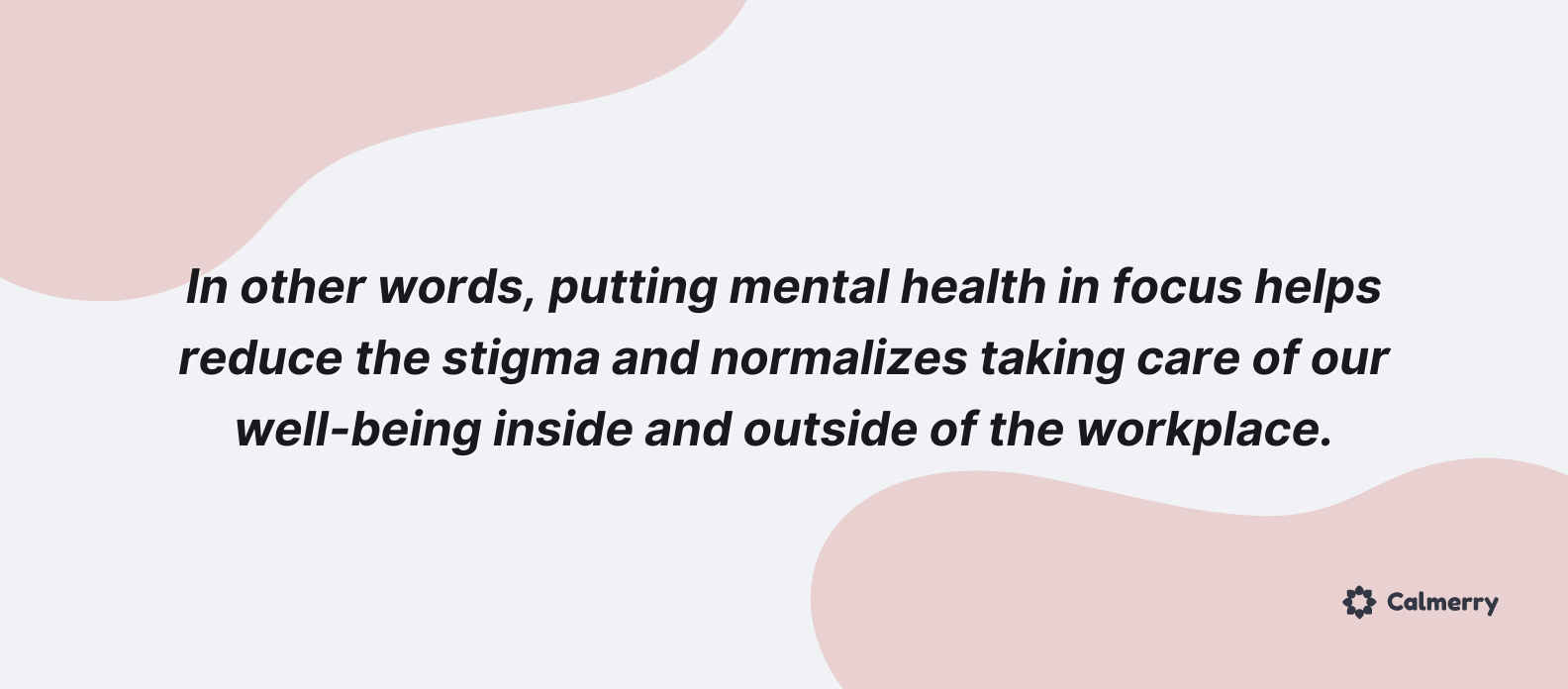
Consequently, it impacts workplace cultures. Employers have started to invest more in supporting employees’ mental health, helping them succeed in their careers and lives by:
- Hiring corporate psychologists
- Adding “mental wellness benefits” to health packages
- Supporting an Employee Assistance Program (EAP)
- Giving extra paid time off or extending breaks during the workday to recharge
- Establishing company mental health days
- Encouraging psychoeducation
- Conducting regular mental health check-ins and surveys
- Equipping managers and HRs to support workers
And these investments are not only about the financial side — they’re also about cultivating a safe, compassionate, and supportive work environment.
At the same time, there’s still much work ahead to change workplace cultures to reduce stigma and start perceiving mental health as an important part of a person’s career path and life.
If you still want to give up your career…
Know that it’s okay! And you shouldn’t be hard on yourself for deciding to pivot in your career path. Actually, there are many successful people who switched careers and transformed their lives.
You should never stay somewhere that doesn’t make you happy or doesn’t allow you to grow as a person and a professional. Take a moment to think about your career and examine what is and isn’t working for you at this point. Reevaluate your aims. Decide if you really want to continue down the path you’re on. If not, ask yourself if it’s the right time to make a switch.
Leaving something behind doesn’t mean giving up — it means saying “yes” to self-care and more opportunities for professional advancement and life fulfillment.
online therapy
live video session



